#Henry fitzempress
Explore tagged Tumblr posts
Text
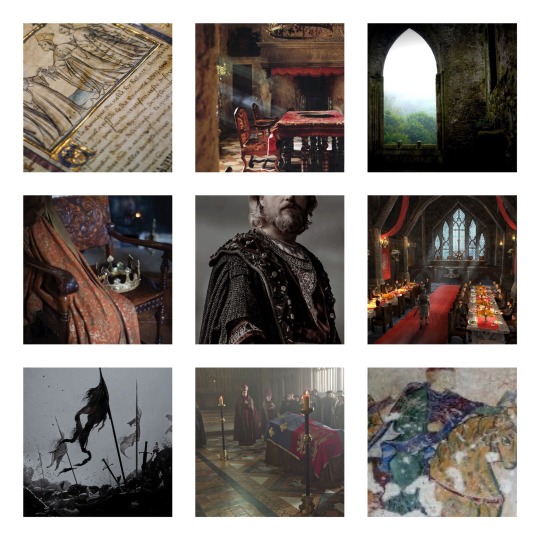
Moodboard: Henry II, King of England (1154-1189).
#plantagenet dynasty#plantagenets#plantagenet#house of plantagenet#middle ages#medieval england#Henry fitzempress#Henry II of England#Henry II#King Henry#King Henry II#King Henry II of England#Moodboard#Plantagenet edit
33 notes
·
View notes
Text
Empress Matilda must have been fearsome. I love that a) she always demanded to be known as Empress, even after her first husband died and b) her son Henry (later Henry II) went by Henry Fitzempress (Henry son of the empress).
"Scholars have offered a number of explanations for why Matilda chose to style herself as domina Anglorum [Lady of the English]. It has been suggested that she might have balked at usage of the term regina, which, translated into the Anglo-Saxon English cwen, implied the wife of a king. The title queen, then, carried with it representational difficulties, as it was the office of king, not queen, that Matilda was seeking. In contrast, the term domina, or hlaefdige in Anglo-Saxon (lady in modern usage), was used to describe a woman exercising political and military power, such as the ninth-century Mercian queen Aethelflaed. As some scholars have suggested, Matilda’s use of the term domina may be related to a wider European usage, as dominus, or lord, described any number of public roles and offices men such as kings performed. Yet another explanation is the convention of kings elected but not yet crowned using the title dominus during the interregnum before their coronation. The title domina Anglorum undoubtedly drew from a number of meanings present in twelfth-century Anglo-Norman society, but all described a woman exercising power. As the Lady of the English, Matilda advertised herself as an individual woman capable of possessing and wielding regal power."
-Charles Beem, "Empress Matilda and Female Lordship", The Lioness Roared: The Problems of Female Rule in English History"
#empress matilda#english history#12th century#henry ii#henry Fitzempress#i read She Wolves and was very impressed by her
963 notes
·
View notes
Text
the fitzempress sons and the velaryon boys
the term fitzempress was born from the fact that empress matilda, in her first marriage, was made empress of the holy roman empire. she never let go of that title even in remarriage - due to her husband being a mere count. she passed this sense of importance to her three sons. her sons had multiple names and monikers but the title fitzempress stuck the longest, especially with henry ii's two younger brothers. the name is deeply close to henry ii as it is his mother who he proudly descended from to inherit the throne of england.
the term velaryon boys was used to refer to the sons of rhaenyra targaryen and laenor velaryon. through their royal and noble parents, they are the known heirs to house targaryen and house velaryon. however, when their mother rhaenyra ascends to the throne - their eldest son, jacaerys velaryon would change his last name to targaryen, to continue the royal line. while lucerys velaryon would be the one to inherit driftmark and continue house velaryon. the youngest of the three sons, joffrey velaryon would also retain the velaryon name.
jacaerys velaryon - henry fitzempress, henry ii.

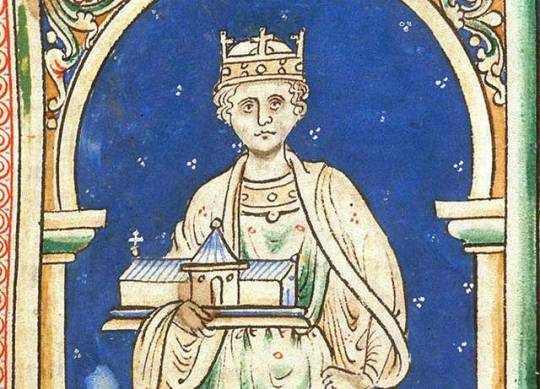
jacaerys's character is heavily influenced by who henry ii, eldest son of matilda, was. henry ii was the most intelligent and dutiful of matilda's sons. he had been a educated by great tutors in his mother's household. his father sent him to his uncle robert of gloucester to have his education in england. there, he was raised with canons of the church who were all prolific academics at the time. he got the best education that is fit for a son of the empress, a future king of england.
he understood many languages but spoke latin and french. he was energetic and zealous and was athletic and liked hunting as a young man. he was also stubborn and strident. from a young age involved in the running of their family's endeavours, taught how to run his father's lands. he was also known to be someone who was fair, he raised people above their station based on merit rather than by station and was also very concerned for the common folk, having emptied his own private stores to aid his people during a famine in 1176.
jacaerys velaryon is the same. he was educated on dragonstone by his mother, where he grew up. he was considerably known to be robust young boy, who was also known to be quite fair in looks. as his mother's royal heir, we know that he would have been educated well as a prince of the realm with trusted maesters and educators his mother would have been able to find.
we do see in the show, where jacaerys is learning high valyrian - he determined to get everything right. and was stubborn and stern in the show. it is also to be known that in the books, jacaerys was well adept at using arms, becoming a prolific squire at his young age.jacaerys was responsible and bold, he was considered savy at his politics and was one to not care about the station of others. he himself was the person who led the venture for dragonseeds, whom all came from various backgrounds. he also led the family throughout the war.
henry ii and jacaerys were heavily influenced by their ancestral descendency. henry ii wanted to rebuild the kingdom his grandfather worked to hold together. we see that in the show elaborated on, where jacaerys declares he should learn in order to bring honor to his ancestors. both of them were married or was to marry women of great beauty, strength and power. henry married eleanor of aquitaine, who held the duchy of aquitane in her own right and ruled with him. jacaerys was set to wed baela targaryen, who was to be his queen and dragonrider like him. lucerys velaryon - william fitzempress


william fitzempress was born the third son of empress matilda and geoffrey of anjou. william as a third son was never really set to inherit anything but he's considered a smart young man and was martially inclined, reading tactics often.he was studied tactics like that of roman military theorist vegetius and used that against his elder brother geoffrey when he occupied one of their family's castles. as he was the brother who shared similarities to his brother and because he most loyal, henry ii favoured him. at one point, henry ii had a council convened to propose the invasion of ireland - where he planned to make him king. but their mother opposed, as she thinks it is not worth conquering.
william fitzempress was born the third son of empress matilda and geoffrey of anjou. william as a third son was never really set to inherit anything but he's considered a smart young man and was martially inclined, reading tactics often.he was studied tactics like that of roman military theorist vegetius and used that against his elder brother geoffrey when he occupied one of their family's castles. as he was the brother who shared similarities to his brother and because he most loyal, henry ii favoured him. at one point, henry ii had a council convened to propose the invasion of ireland - where he planned to make him king. but their mother opposed, as she thinks it is not worth conquering.
instead, henry ii made up to his brother by giving him land, wealth and titles. when he was in his mid 20s, he was set to wed isabel de warenne, countess of surrey who was a rich heiress. however their marriage required a dispensation due to their close affinity. thomas becket, who was archbishop of canterbury refused to help - he and king were at odds.unfortunately, william died suddenly - they said of a broken heart at the age of 27. henry ii was distraught at his brother's death and blamed becket- furthering conflict. when becket wss murdered by knights under henry ii's employ, they screamed of vengence for william's death.
lucerys velaryon was the second son of rhaenyra targaryen and laenor velaryon. unlike william, laenor and his father made lucerys heir to driftmark at his birth. lucerys was just as robust like his elder brother lucerys whom he was close with which we saw elaborated on the show. as elaborated on by the show, lucerys is warm hearted and kind. just as william proved, lucerys is loyal to his family to a fault even against other kin. like william,
he also is for his martial skills being known for being adept at using arms just like his elder brother. lucerys in the show was someone who shunned power, but did his duty. just like william, he knew his duty and his place was to support henry ii's rule as king - lucerys made sure to support his own mother queen rhaenyra during the dance of the dragons as a dragonrider and envoy. like william, lucerys velaryon suddenly died young after his uncle aemond killed him and his dragon arrax over the skies of storm's end. his death just like william's, lead to the deepening of horrors to come. and just like william, lucerys velaryon's death was avenged brutally.
joffrey velaryon - geoffrey fitzempress, count of nantes

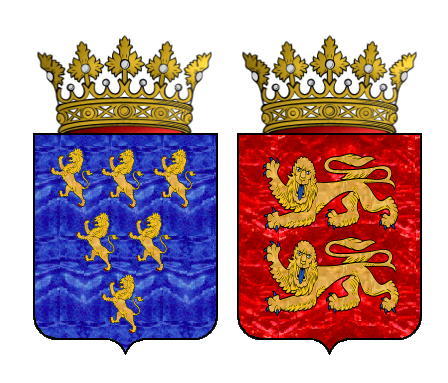
geoffrey fitzempress was born the second son of empress matilda and geoffrey of anjou. he was named in honor of his father during the war as his mother was off in england, defending her claim to the throne. as he grew up with his father, it was the count of anjou who chose how his son was to be raised however we know little of what went through on in geoffrey's life at this time due to lack of records. still, when his father passed, it was thought that he was his father's heir. being a second son, this meant that should his elder brother claim normandy or england, anjou would be ceded to geoffrey.
however his brother henry ii did not cede the lands to his brother and instead, when he turned 16, young geoffrey became count of nantes. geoffrey considerably was eager to prove himself as powerful and worthy. he often did this by making plots. he would occupy castles and force his brothers to siege them. he also tried to plot to get eleanor of aquitaine to wed him however that failed completely. geoffrey however always made up with his family quite often, even escorting his brother henry ii and his newly wedded wife eleanor back to england around the same time. he continued to try and prove himself and fought his brothers - ending up dying young suddenly aged 24.
joffrey velaryon was born to rhaenyra targaryen and laenor velaryon as their third and last son. just like geoffrey, the youngest son was named to honor someone. in joff’s case, it was his father's departed lover and friend, joffrey lanmouth. just like his elder brothers, joff was also born robust of body. like his historical counterpart, we know very little about how he grew up after the incident in driftmark, both book and show. however we know that joffrey is a loyal and honest boy, having fought off his uncle aemond from claiming vhagar during his father's funeral. that being said, unlike his historical counterpart, joffrey velaryon was a third son. however, both are certainly in the same predicament, which is that their position as a member of their family is yet to be determined.
however joffrey was eager to do well and prove himself worthy of being his mother's son just like geoffrey. the difference however is their approach towards it. while geoffrey favored trying to fight his family to attain glory, joffrey velaryon was resolute to prove himself by fighting for his family and ensuring that he contributes to their family's success in the war - in order to make his mother queen and avenge his departed family. however just like geoffrey, the youngest velaryon son was destined to die young. while we do not know how geoffrey fitzempress died, he did not perhaps die so miserably and horribly like joffrey did. but unlike geoffrey, joffrey velaryon died trying to serve his family.
#fire and blood#asoiaf#house of the dragon#hotd#f&b#jacaerys velaryon#lucerys velaryon#joffrey velaryon#medieval history#henry ii of england#wiilliam fitzempress#geoffrey fitzempress
9 notes
·
View notes
Note
I have seen a post comparing Steven's adoption of Henry II in the anarchy with what the Velaryons did with the Strong boys wanting to justify that their claim is legitimate, but in my humble opinion it is not comparable at all. This situation could be extrapolated to Aegon II having adopted his nephew Aegon (that was the LEGITIMATE son of his political rival) having himself a living son, in addition everyone would know that he is not his son and well in this case it would not be applicable but the adopted heir retains his family name...This is not what happens with the Strong boys, It has nothing to do with the modern concept of adoption that they want to apply. I don't understand why it's so hard for them to accept that these guys had no real claim to the throne. They can continue enjoying their characters accepting that they are bastards in every sense of the word. Do you think they are comparable situations?
I haven't seen this argument myself but clearly those are two completely different situations. Stephen didn't adopt Henry II, he made him his heir as a compromise to end to the civil war. And yes, the clear parallel would Aegon II naming Aegon III his heir over Jaehaerys and Maelor, had they survived. Again, this was part of a peace treaty. Everyone knew who Henry II's parents were, and there was no question of his not being trueborn. Henry II was still Count of Anjou, the title he inherited through his father, and styled himself Henry FitzEmpress in honor of his mother.
To understand why this happened, we need to look at some context. Henry II was only 20 when he decided to re-take his mother's throne, and Stephen was past 60. At that point England had been at war off and on for the better part of 15 years and both the clergy and the lords were unenthusiastic about continuing and forced Henry and Stephen to the peace table after Henry made some early gains in his campaign. Stephen respected Henry, and Stephen's own sons were kind of uninspiring as future kings go. Eustace, the older son and main obstacle, died before Stephen did, and the younger son, William, agreed to renounce his claim. Stephen never really took the throne due to strong personal ambition in the first place, but because he was persuaded by people close to him that Matilda would be a poor choice for queen, both due to her being a woman and due to the influence of her husband, Geoffrey of Anjou, who was pretty well hated in England. Leaving the throne to his children did not seem to be a major consideration for him when all was said and done. Conceding heirship to Henry II meant that the fighting could come to an end, and the country would be in capable hands, but Stephen himself would not face the humiliation and possible consequences of being outright deposed. As it turned out, Stephen died not even a year later, so Henry II took the throne sooner than expected.
Rhaenyra's Strong children are bastards that she's trying to put into the line of succession while claiming they are trueborn. They were not "adopted" by the Velaryons. The medieval world did not have a concept of adoption like we do in the modern world (Rome did, but not medieval Europe). The reason why it is treason to call them bastards is because what Rhaenyra is doing is illegal, and Viserys, Corlys, and Laenor are shielding her from the consequences. I wrote a post here about the whole idea that Rhaenyra's children are not legally bastards, but I have to admit comparing them to Henry II becoming heir after Stephen is a new one!
#sometimes an ask appears that makes you set aside all other waiting asks and immediately hop on it#asks#historical parallels#hotd discourse#hotd meta#team green#anti team black#anti rhaenyra targaryen
34 notes
·
View notes
Text
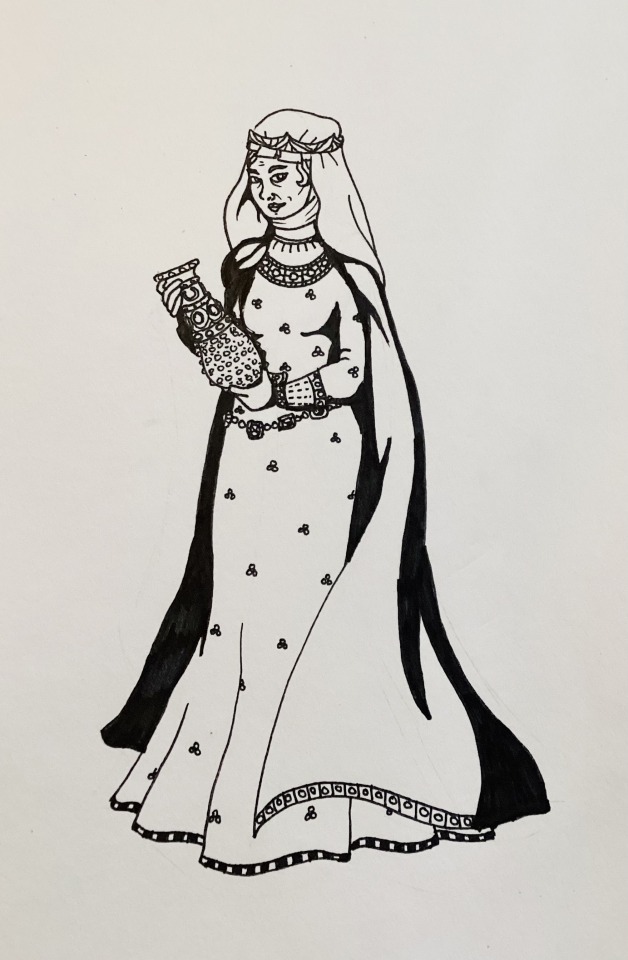
It’s October - and that means it’s Awesome Ladies of History, Year Four! I’ll be bringing you 31 of history’s most interesting women, from the iconic to the forgotten, starting off, as per usual, with a figure from the iconic side.
Time for Eleanor of Aquitaine!
Eleanor was the elder surviving daughter of William X, Duke of Aquitaine, the most powerful vassal in 12th century France, a man who controlled far more land than his nominal overlord. Eleanor’s name, Aliénor, or “other Aenor,” referred her her mother, who died when Eleanor was a small child; her father likewise passed when she was twelve or thirteen, leaving her Duchess of Aquitaine in her own right. Duke William’s will made Eleanor a ward of King Louis VI, who bethrothed her to his heir, another Louis, and then promptly died himself, leaving the two teenagers as king and queen of France. Young Louis initially adored Eleanor, but the monkish king and high spirited duchess were ill-suited. Eleanor, to the horror of church authorities, accompanied her husband on the Second Crusade, but the campaign was a disaster, and their already-shaky marriage disentegrated along route, despite the Pope himself attempting to mediate. With two daughters and no prospect of a son, Louis and Eleanor managed to arrange an annulment… and Eleanor promptly married again, to Louis’s rival Henry FitzEmpress, soon Henry II of England. Initially, this marriage was, though not without turbulence, a happier one. Eleanor and Henry had eight children, including five sons, one of whom died young, and Eleanor, despite later legends, seems to have accepted his affairs with the equanimity of someone whose maternal grandmother eloped with her paternal grandfather. He trusted her enough to eventually allow her to rule her duchy in person on his behalf��� trust that proved misplaced. When their sons, including her favorite, Richard, revolted against their father, it was with Eleanor’s support, and it was Eleanor who faced the consequences; Henry imprisoned her for the rest of his reign.
Richard’s accession, however, set her free - and also made her perhaps the most powerful queen mother in English history. She arranged his marriage to Berengaria of Navarre, held his continental lands together during his prolonged absences, and raised his ransom when he was kidnapped returning from the Third Crusade. His death in 1199 devastated her, and her relationship with her youngest son, King John, was more fractious. She took the vows at the nunnery of Fontrevault, and died there soon after, already a legend in her own time.
#eleanor of aquitaine#french history#british history#awesome ladies of history#October 2023 edition#my art#history#pen and ink
44 notes
·
View notes
Text
“On 5 March 1133, Matilda gave birth— to her immense relief— to a healthy son…Any mother might be proud of her newborn but for her, there was the added weight of all that he represented. His birth wiped out the humiliation of her having been considered barren, of not having borne the emperor a son; and it strengthened her position as her father’s heir. She wept for joy at his baptism (the only time she is ever reported as shedding tears in public), and Henry would be her favorite child all her life. And he would take his sobriquet from neither father nor grandfather but from his mother: by his own choice he was known later throughout all his lands as Henry fitzEmpress.”
- Matilda: Empress, Warrior, Queen by Catherine Hanley
6 notes
·
View notes
Note
I just realized something. Neil MCDONALD is the son of Mary MCDONALD (who had that name while in school, so it’s not her married name). Susan BONES is related to Amelia BONES on her mum’s side. Does this mean that in the Wizarding World it’s just as common for kids to bear their mum’s surname? Or there are other reasons? (Mary is married to a woman and they liked McDonald better, Susan’s dad decided to take his wife’s name, etc…)
Yes! So I wouldn't say it's common, but I know a couple of people IRL who have taken their mother's surname, and I think Mary Macdonald would be one of those people. (Admittedly, part of this is me as-self-indulgent-author wanting to wedge in a Marauders-Era cameo — for Neil to be recognized as Mary's son, I felt like I had to tie them together, since having McGonagall just announce that Neil's mom is Mary in Ch48 seemed a little ham-fisted. But I also think it's in-character for Mary to want her son named after her, regardless of whom she's married to.)
Susan Bones is a bit of a different story. I didn't initially know what to do with Susan's family tree, because in canon, it's said that the Bones are all dead — Hagrid tells Harry in Philosopher's Stone that Voldemort killed off "the McKinnons, the Bones, the Prewetts." Which implies that the same thing happened to all of them, right? And there are no more Prewetts or McKinnons, so it would make sense to assume the same thing about the Bones — except there are at least two Bones in the story. So I interpreted that as meaning those families are dead in the male line, and Susan was named for her mother's family because they wanted to continue the tradition (and maybe tie in her famous aunt/wizarding ancestry; I can totally see mixed-blood families using the wizarding surname, regardless of gender, in order to give their kids an easier time of it.) In that reading, Hagrid's line just means he's not aware that Susan took her mother's name, which makes sense, because at that point he doesn't even know Susan exists.
I think purebloods stick more rigidly to patriarchal nomenclature — Draco is a Malfoy, for instance, even though the Blacks are arguably the more powerful family; interestingly, in the really old days of nobility, men would sometimes take their mother's surname if she was more powerful than their father, especially if she was of the blood royal (as with Henry FitzEmpress and Robert FitzWimarc). But by the twentieth century, I can't see that happening unless the identity of the father is in doubt. So Neil and Susan are just two of those cases where families decide to do their own thing.
12 notes
·
View notes
Text
correct! John Lackland was so-named because as the youngest legitimate child of his father Henry FitzEmpress he was not expected to inherit any land. however, after all his brothers died without legitimate heirs (with one nephew possibly being murdered by Lackland), he took the throne of the angevin empire with the death of his brother Richard Lionheart - and all royal land that came with it
he did, however, never own a New Nintendo 2DS XL, despite its sleek design, competitive price, and nipple
HISTORY QUIZ!
51 notes
·
View notes
Photo
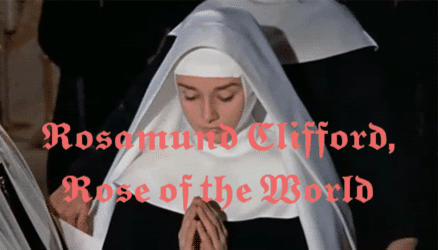
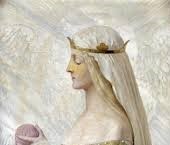
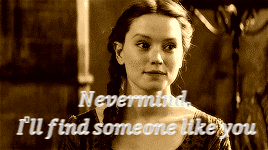


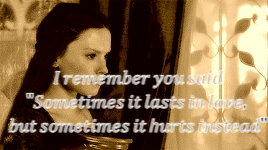
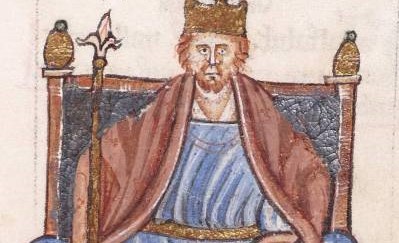

❁ « 𝔐𝔢𝔪𝔬𝔦𝔯𝔰 𝔬𝔣 ℜ𝔬𝔰𝔞𝔪𝔲𝔫𝔡 ℭ𝔩𝔦𝔣𝔣𝔬𝔯𝔡 » ❁
Godstow Nunnery, Oxford. Winter, 1176.
There has been talk, as there has always been. There has always been malicious glance of all parts as if those who casted their judgemental looks were saints themselves. As if taking their veils proved them holy.
It mattered little now than before, as if gossip and hypocrisy once troubled the peace of her spirits. She had more concerns to be preoccupied to, one of which was her own health. On that particular morning, she was unwell. Not /that/ particular morning, but every day ever since the headaches began to flow to her body somehow.
They blame my poor health for my sins.
She remembered the mater superior scowling at her. She should have been more humble, take the cross Christ put on her shoulders not because she loved dearly with all her heart, but because she was a harlot in everyone else’s eyes. In truth, was she?
Love is a sin, you ought to repent for it.
Rosamund could hear Henry’s laughters. Hal, as she used to call him, would have tell her to pay no mind to those old cows. The idea, even now, brought a small smile on her lips. But the shadow of a smile, the shadow of what once was Rosamund, was there no more. She had to repent silently and would embrace death alone. She remembered the days where the local bishops came to scowl at her for her “nature”. Some of his enemies, within the church, would come at present to insult her. She had no friends, if one at all she could name such. Even then, Rosamund had no reason to regret.
I would have done all the same if I were given the same opportunity.
Bitterly, she swallowed the tears that wanted to drop her eyes. Rosamund sighed. When looking at the walls where she was staying, still in bed, the walls made of stone were naked before her eyes, barely baring a poor cross. There was only one simple table and one simple chair, a view to the outdoors on the left through a dusty window. There were no courtins, there was nothing. But even there, Rosamund saw through the window, contemplating the clouds that were trumbling against one another in a sign of upcoming storm. Green hills with nothing but pasture and cows. Small houses and far beyond her reach she knew there were small folk doing their tasks for the priory where she was in.
If Henry saw this now, he would have surely scowled at this condition. But I don’t think he understood how little mattered the lands, the greatness, the richness in comparison to the love that flew easily between us.
Death was close, she knew. Whatever the cause of the pestilence that hurt her lungs, she knew it would soon come to an end.
How can love be a sin if all our Lord preached was love?
But it mattered not. She would cherish the memories to her heart. Rosamund coughed harder. It was cold, even though the door was closed and she had a simple blanket. She wanted it all to be as simple as it should befit her position. Most nuns would disdain her for it, but Rosamund never truly gave to other people’s opinions. She prayed now, though, for the comfort of her soul. She would not like to announce she was dying, it was vain and she had no interests whatsoever in troubling the mater superior.
In the midst of unbearable cold and painful pestilence, Rosamund closed her eyes, now lost in the past. It was more colourful and lively than the present, and although it should be said that it was never wise to dwell in the past, to seek the comfort for her soul, it’s what the former Rose of the World just did.
━━━━━✵━━━━━━ ✵ ━━━━━━ ✵ ━━━━━━ ✵ ━━━━━━
Rosamund was the youngest daughter of Walter de Clifford, a minor lord of the Welsh marches, and his wife Margaery, sometimes spelled Margaret. She had a couple of older siblings, but only Walter, Amicia and Lucia survived into adulthood. Rosamund remembered being closer the most Lucia, both in temper and age.
She recollected they often liked to dress equally as children in order to confuse their mother. It was a happy childhood as one could have back then. The world of violence, pestilence and all other mundane things had not yet reached Castle Clifford, where she spent most of her days in between prayers and sewings. Sometimes, her father would receive a wanderer bard and welcome him into his hall.
The bard would sing stories of kings and queens, courts of love, chivalrous knights who were brave enough to stand for honour and bring justice in a lawless realm. His voice was so charming that Rosamund remembered Amicia sighing over him constantly. Her mother, a woman conscious of whom she descended (from a lineage of anglo-norman nobility), could be stern at times and would not hesitate in reprehending Amicia for her childish behaviour. But their father, Walter, would laugh and say:
“Let them be children, woman.”
“They are not peasants”, it was Margaery’s response. “They are damzels, ought to behave perfectly.”
But when they were not giggling, they were behaving perfectly. Of the sisters, however, Amicia would be the most temperamental. She, like the rest of the ladies, was born with flaming hair and light brown eyes. Rosamund remembered her laughters the most, but also the one who was prompted to mischiefs. The next one, Lucia, another redheaded lady, was not so outgoing. She certainly seemed to have had an inclination to the Church, but their father refused to send any to the church. He hoped to increase the family’s health through the marriages he was beginning to seek for his girls.
And then, there was Rosamund. Her oval face showed high, pink cheeks, rounded eyes coloured brown; her nose was long and her lips, full. Her hair was also painted with red. She was the quietest of the ladies and, to her father’s despair, another one with inclinations to a religious life.
“Nay, I say!” She remembered one night her father was yelling with their mother. “I shall not send any of my children to the church! I can afford their dowry, what makes you think otherwise to suggest such a thing?”
Nonetheless, Rosamund continued going to the chapel more than thrice a day. She felt peace within it, perhaps more so than in between walls made of stone with long corridors and displayers of wealth. She knew nothing about her own ancestrality, except there may had been one great-grandfather coming from Normandy to William, the duke who suddenly became King of England not so long ago.
But she found comfort in the long gardens, well looked after by Mistress Joan, taking a seat beneath the trees and read--surprisingly an hability she and her sisters had, taught by one tutor of the church their mother hired the services--a book of poems. Rosamund shared the spirit of romance with her older sister, and it was not rare, as they grew up, they spent time proclaim poems of the sort.
In one of these early days, when a lady of their mother accompanied the girls for a stroll, Amicia would promptly say:
“Rosa, Rosa, are you not aware of how your beauty makes a man drop on his knee pretty soon?”
Lucia giggled softly, but Rosamund could not comprehend entirely. They were now into womanhood, Rosamund being no more than 17 years of age. They had not so much contact with the men, even though in their region there were growing feast to which her family was, much to Sir Walter’s pride, invited. Rumour had it that the king himself would come soon, whomever this man may be.
“What, in God’s name, are you saying, sister?”
Amicia and Lucia exchanged amused glances. Rosamund felt irritated because young ladies who did not possess completely control over their own perceptions around them would surely be irritated by such provocation.
“Father has decided the three of us will marry soon enough, and together, so one feast can be held on behalf of us!” Amicia was explaining. “He must really love us for trying to get rid of us so soon! Mayhaps not soon enough, as I reach the nine-tenth year of my life, if mother’s count is correct, and I’m old to arrange a fanficul espouse. Well, as I was saying, in between the arrangements, he made a proposition to a baron who was feudal lord to the Prince of Gwynedd for making me his wife. Yet, the man claimed he would have preferred to despouse you instead of me!”
Rosamund immediatedly interrupted the movement of her feet. Pink coloured her cheeks and her eyes went wide.
“I... I never put my eyes on the man, sister!”
Amicia laughed at Rosamund’s simplicity.
“I know you have not, but he seems to have done so. Whomever be your consort, my sister, you will make the man very happy indeed!”
Much to Rosamund’s consternation, the conversation turned to teasings that she particularly detested. She was timid when, in the rare events she went outdoors the castle whether to accompany her mother’s lady to the market or even more so to fanciful royal events her family began to attend, eyes were drawned to her figure. She hated it. It was probably due to her red locks, brighter than her sisters’s. But her mother would remember that this was a good thing, for she would not take long before arranging a suitable suitor.
Rosamund did not know back then, but lady Margaery’s amusement remark would prove to be correct. It was not any suitable, proper suitor she would capture the heart, but the one of the king of England himself.
━━━━━✵━━━━━━ ✵ ━━━━━━ ✵ ━━━━━━ ✵ ━━━━━━
The fatidic day likely occurred in a summer day, Rosamund could not be sure. The reason of why there would be a great feast for the Welsh lords was to receive the king in order to appeal his “conquest thirst” that he inherited of his great-grandfather, another conqueror.
“You should go very well dressed”, said lady Margaery to her daughters as she and her own ladies brushed their hairs and picked the best silk gowns they afforded having. Rosamund would dress a blue one with white pearls around the long sleeves, her flaming hair locked in a long braid. Her sisters would dress green and yellow silk gowns, each one lurking for the opportunity of finding a proper husband that evening. “For all the important men will be there and it’s important, God knows how, you succeeded in capturing their hearts..”
“And gold”, remarked Lucia, making all of them laugh except their mother.
“Now, Lucia, don’t be silly, child. You are no more in this age to make jests. You are a lady now.”
But the giggles carried on effortlessly. Later, at another castle built of stones, Rosamund was just another lady in between the present nobility. The hall was well provided, she could see how great--certainly bigger than the castle she grew up--were the saloon, the decorations and well dressed were the knights in their armous, but forbidden to walk inside carrying their weapons.
There were musicians too, of course, a sweet melody mastered by the fingers of such men. Rosamund remembered the tune, how it brought a comfort feeling to her heart, and how it made her smile It was her first experience in such an event and she was, naturally, as excited as any other lady in her position would be.
In more cheerful spirits was Amicia, whose hair, divided in two combed braids, fell over her green gown. She looked everywhere and would spare no smile to any lord who threw curious glances at her.
“She will sure arrange a husband this day”, Rosamund whispered to Lucia, making her sister chuckle. “Father and mother will be back home in content spirits!”
In the meantime she settled with her sisters and her father and mother went on to greet other noblemen and their wives there present, one could hear the sudden excitement that arouse from the small amount of self-entitled-important men. The king, Rosamund was told, had arrived.
At first, she was curious to see who was this man. Lucia, the brightest of the sisters, explained:
“Henry the King is the second of his name to rule all over England. He is a powerful man, vain some would say and most temperamental. Those who witnessed it, claimed that it was an awful vision to behold.”
Rosamund was not impressed, though.
“Most kings must behave in such a manner, otherwise how else will they earn respect?”
Lucia shrugged her shoulders.
“But Arthur was not temperamental..”
Rosamund smirked.
“He is not here yet, Lucia, so we must await for his rise.”
Her sister ignored the comment and carried on. As she did, their eyes followed the multitude surrounding the king. Henry the king was tall, Rosamund noticed. His hair was red, although of a different shade than hers; his face was oval and it captured strong features. His eyes, however, mirrored the smile displayed on his lips, enhancing his charisma.
“And he has quite some reputation with ladies, too. Have you not heard how he seduced the queen of France and took her as his wife?”
Rosamund’s eyes were following the king’s moves when, in this exact instance her sister was proving to be one with very attentive ears, Henry II’s gaze locked with hers. It was for a brief instance as she, paled at how intense and abrupt this encounter with each other’s eyes were, quickly looked away.
Unaware of what just happened, Lucia told Rosamund:
“Aliénor, the queen, was born in the duchy of Aquitaine. She was reported to be so beautiful and elegant, but most of all, rich because Aquitaine occupies large portions of lands in the continent.”
Rosamund rose her eyebrows:
“How on earth would you know all that?”
“Father has been receiving important people at the castle, in case you have not noticed and I’m always eager to know the stories of the court they brought.”
“And what is like this Aliénor? How did she become Henry’s queen?”
As Lucia was telling her the story, Rosamund was completely unapprehensive of Henry’s curiosity. She would not know how her red hair and soft features were a contrast amidst the other ladies with more olive skin and darker eyes than her own. She was unaware how Henry was completely intrigued by this mysterious lady whose eyes so innocent and filled with curiosity found his own. Another redhair, mayhaps, but it was not like anyone.
One of Henry’s companions followed the king’s gaze and said:
“That is mistress Clifford, m’lord. A daughter of one of the minor lords of the Welsh marches. Her name is Rosamund, she’s the youngest of Sir Walter Clifford’s brood. She’s to be betrothed soon with her sisters...” He continued to proceed, almost nonchalantly about Rosamund and her family, but Henry was only partially listening.
“Would you bring the said lady to me?” Henry interrupted him.
It was lust at first, as often was. The man hesitated for seconds, but he eventually agreed to. Who could deny the overlord of Scotland, lord of Wales and king of all England anything at all?
━━━━━✵━━━━━━ ✵ ━━━━━━ ��� ━━━━━━ ✵ ━━━━━━
Rosamund was delighted to meet other ladies of her age. She had spent very little time outdoors and her only companions and friends she relied on were her sisters. That evening, her father and mother granted permission for them to enjoy freely as long they were under supervision of lady Margaery’s lady-in-waiting, a Welsh maid of the name Guinevere. So far, however, the only amongst the three sisters to have enjoyed more than the rules of good sense cared to permit in courtship was Amicia.
Rosamund and her new friend, a lady named Heloise, were discussing poetry when mistress Guinevere were scowling at Amicia for her unproper behaviour. It was also when the king’s valet came in between them.
He cleared his throat, and by how arrogance was stamped all over his face--which was not one very nice looking, in Rosamund’s opinion, marked by scars or old pestilences as a sign he struggled to survive infancy or mayhaps the favour of God in sparing him of such unfortunate death; his eyes were narrowed with impatience, and yet she could swear they were painted with the deepest shade of blue; the man’s nose was long, but it was crooked, a sign he was involved in unnecessary fighting or wars he was forced to fight, Rosamund could not be sure. His sandy hair was short and oily, and his cheeks were rosy. He wore dark robes that could easily mistake him to a priest. And yet, when coming to her and this new friend Heloise, the man looked as if he was mostly obliged for doing so, an interpretation that, as she would find out, was not entirely incorrect.
“Mademoiselles”, he began with a heavy French accent. Luckily for him, Rosamund could speak the language, but pretended she would not understand him. Maybe he understood it, for he, against his own will, was forced by circumnstances to speak the local tongue. “Mistress Clifford. His Grace, the king of England, wishes to see you.”
Lady Heloise covered her mouth with her tongues, but Rosamund, as flattered as she might have felt with the attention of such a king, was not entirely sure if she should meet a man let alone a king.
“For what purposes, my lord, would the king be interested in seeing me, a mere damsel?”
She could tell her lady friend was very much puzzled by her words, which, Rosamund thought, could be seen as a demonstrative arrogance, when in reality she was motivated by her pious education she received. Surely her mother would be very displeased if she heard of such a thing? Her flower should be preserved for her marriage.
As naive as she may have been, Rosamund did not lack brain.
“Alas!” The king’s valet exclaimed, for this was the first time he found in such situation. Rarely would a lady, whomever she may be, question such a thing. “For what purposes? The king has taken a like of you, my lady. Should there ever be another reason for it?”
He laughed.
“’Tis the king of England we are talking about. Should we leave him wait for more than we already have?”
Rosamund flushed. She understood her position as an unmarried dame in those days, and because of it, remembering Henry II, as king as he may be, was still a man and a married one. She would not go against the laws of the Church.
“I may sound a fool to you, mister, but out of respect for the queen he is lawful married before God and for me, a damsel who has not yet become a respectful espouse to some lord, I cannot give in to such follyness.”
And without waiting for response, she stepped away, moving straight to the direction of mistress Guinevere with a very shocked lady Heloise by her side, stunned as she was what was seen for she said no word. Rosamund’s face was all red and one could easily tell how angered she was.
“There you are, Rosa!”, said Guinevere, greeting the other’s friend. “I see you have acquainted yourself with other admirable ladies, but your face shows me displeasure. What, in God’s name, has been the cause of such distress?”
Lady Heloise, who payed no mind to discreetion, spoke for Rosamund:
“The king wanted to see her and she declined him!”
Guinevere and Rosamund’s sisters looked puzzled at her, whose pale pinks were painted with another shade of deeper red if possible. She could not meet their inquiring gazes, so her eyes were down to her feet.
“How did this happen?!” Amicia, naturally, was the first to say, quickly taking her sister’s hand into her own. “You should not decline, my dear Rosamund. Oh, how fair are you! God has a purpose for you, my sister, as I have always known! ‘Tis with what other reason for being born ever so graceful and fair as yourself?”
“My dear sister, do not say flatteries to me”, pledged Rosamund. “I am not a harlot, and cannot give into such reputation. He is a married man.”
“He is the king of England”, said Amicia, eagerly. “We could have benefited from it.”
Impatient, Rosamund, who realized she would not receive support from either mistress Guinevere, who looked astonished by the reports Lady Heloisa unashamed gave her, nor her sisters, who suddenly forgot all morals about involving oneself with a married man.
Silently, she slipped off their companionship and in even quieter frustration she moved to an empty are of the castle, wherever this may be. Perhaps the gardens? But she would not dare to go to such a darker spot. No, the hall would be nice. There were guards, one or two small groups engaged in conversations, so she sat at a far from the crowd bench where she sat.
But there would be no time to contemplate alone with her own thoughts for Henry, king of England, was not one very accostumed to receive declines to the invites he extended to those he appreciated. He was rather intrigued by what cause had motivated her to deny him the pleasure of her company and his eyes never left her face or moves in this time. Even the group that surrounded him was aware his mind was out of reach.
Henry observed as Rosamund stomed over, face flushed probably the result of being offended. He began to wonder if that was because of him. By how her sisters behaved, or so he assumed being the ladies under the supervision of an older mistress, he presumed so. Discreetly, the king excused himself off the duties and began to search for her. Did not take long before he did.
“I pray I have not troubled the peace of your mind”, spoke he with a heavy French accent.
Rosamund pale, startled when hearing his voice. Her eyes went wide and she quickly dipsied to a curtsy when raising from her seat. But, seeing the fear in her eyes, Henry could tell where this refuse came from. He quickly said:
“Please, my lady, be fearful not of me. I came here to apologize.”
Rosamund’s features soften, although there remained in her eyes a mixture of amusement and suspicious.
“Apologize, my lord? For what cause would have the king to apologize?” “My lady, you mistake me to an arrogant and distant creature...”
“And are you not, sire? A king unreachable to many of us, your subjects?”
He sighed. But Henry was decided not to give in as much as Rosamund.
“I’m still the son of the Lord as much as you, madame Clifford. A crown placed over my head because of His command, solely so. I did not mean to offend you.”
Rosamund’s eyes remain locked with his, but her body languaged indicated she still distrusted him.
“I... How can I think otherwise? I am a damsel, Your Grace, not a harlot you can share a bed anytime. I am unmarried, and what will people think if they see us engaging in conversation out of their sight like this?”
Henry took a seat on the bench she was formerly sat. She watched frustration, and maybe anger, rise in his features, but countered somehow by resignation in his eyes. Those eyes were painted in deep blue, and Rosamund thought it must like seeing the sea, for there was something in them that could drown her. A shiver came in and she quickly lowered her eyes to her feet. She could not... She could not...
“To the hell the men and their malicious minds. I came not to pervert your innocence, my lady. I see I did make the mistake in thinking you were like the others when you are not.”
“The path is free for you to go then, sire, for I will not give you what you came to seek”, she heard herself speaking.
When did I ever become this bold? And before a king?!
But Henry laughed. And his laughter sounded like a thunder, giving much cause for the raise of Rosamund’s gaze, for she was intrigued at how... human he sounded. He, so divine being, could truly be a man?
“You captivated me, my lady. May I not enjoy your company throughout this evening?”
“I fear to say there would have more interesting damsels to accompany your lordship, but if it pleases you, sire, I shall stay” she said, humbly.
Henry gave space for her to seat, patting it so she could seat. Rosamund, not any less uncomfortable than she was before, obeyed.
“It pleases me. But does it please you?” He inquired, his eyes looking for hers.
Rosamund flushed.
“I... I... Why would you ask this, sire? You are the king”, said she, softly.
“For this same reason you exposed, my lady Clifford. Because I am the king, people assume what do I want and desire, and for long years this was enough for me. But to live amidst the flattery and falsehood is becoming tiresome. It is as if I live in illusions, illusions that could never grasp the reality I aimed to live.” He explained.
Rosamund found herself surprised by his words. Somehow, she sensed the truth beneath them.
“How did you become king, sire? Looks like a heavy task to burden your lordship to.”
Henry shrugged his shoulders, but his eyes were no longer holding hers, staring, instead, into the void of what Rosamund presumed to have been the past, of years she never witnessed or heard of.
“I have inherited my mother’s claim. You are not familiar with the whole thing, are you?” A smile crossed his lips when seeing Rosamund shaking her head in negative. Somehow it made his chest swollen with pride. “It all began from the day my uncle, my mother’s brother, was drowned. His ship hit a rock or something of the sort, and he tried to save the people that were in the same ship as his. By doing so, he died.”
“My condolences for his loss”, Rosamund whispered.
Henry smiled. It was a more sincere one, Rosamund observed.
“I appreciate it, but I fear to tell you that us, royals, display of little time to grief. My mother was his heir, her father, the first king named Henry of this realm, made his nobles to vow loyalty to her, but he should have known that men are like beasts. They switch their loyalties easily as gold”. He now spoke with a sudden bitter that intrigued Rosamund even more.
He carries his scars, his pain, his hurt and buries them beneath out of the general sight. Oh, how heavy must be to carry the crown over his head!
“He died and my mother should have been crowned, but she was pregnant at the time of his death, so that gave space for Stephen to usurp her rightful place as lady of the English. It was a civil conflict that, in the end, brought me here.”
Rosamund listened, and Henry was surprised for her genuine listening. Not even his wife would do such a thing, he noticed.
“You sound unhappy for the events that led you here, sire, if I may speak freely.”
“You may speak freely as you wish, as I have said, it tires me to hear flattery most of the times.” He said. “I shall not be untrue to you, my lady, but I do enjoy being king. What abhorres me the most is their motivations, how easily convertible are their loyalties. In one day they welcome in feasts like these, in the other they are plotting against me.”
Rosamund listened again, unsure of what judgement should she give him, although she presumed he was being sincere. She never met too many men who would speak with their hearts, or any man who did so at all, but his eyes... when looking into her own... There was something unexplainable to her. Yet, she had to be realistic, as much as, surprisingly to her, it would be disappointing to taste the flavour of it when she said:
“But your wife, my lord... Surely she would support you as a queen should.”
Henry made a sound that Rosamund was not entirely sure what it is, by how his features changed all of a sudden, it looked like the queen did not make this king happy either.
“She does not. All she cares about is her court of love she tries to reproduce in Westminster.” Henry scowled. “Her vain courtiers doing all she pleases, her children...”
“Who are yours too”, she kindly reminded him.
“Well, she acts otherwise!” Henry said with gritted teeth.
Rosamund said nothing more, but instead allowed him to speak out the anger within. As far as she understood, one of the major issues with the queen was having his illegitimate children raised with their legitimate ones and favouring one son over another in all matters. There were the legacies involved too, a series of issues that, from her perspective, were faulted on both parts. Although she could not understand why a mother would favour one son over the other, which made her furrow her eyebrows.
This captured Henry’s eyes, for of all he told her, it was only in the matter of children that he received some reaction of her.
“What is it that is troubling you, my fair lady?”
Rosamund blushed at the compliment, but ignored it when responding him:
“Forgive me, sire, for I am not a mundane lady. I know little of this world, and understand even lesser the complications of motherhood. Whilst I comprehend what lies before me when marrying a lord, I cannot discern how a mother’s love surpasses all other children to concentrate in one alone.”
Henry smiled at her.
“Your remarks are far more intelligent than any other lady I have ever heard.”
“That is untrue, sir”, protested Rosamund, although a small smile curled upon her rosy lips. “For your lady wife is famed for doing good use of the brain she has.”
“Whilst this is accurate, I cannot say she has been using it on good matters.”
Rosamund smiled.
“What other matter could occupy a lady’s mind out of a lady’s own world? Hence why I cannot see the choice of one son over another.”
“Preferences”, it was all he said, vaguely so.
Seeing this was a subject he was not particularly into, Rosamund decided to quiet her thoughts. But Henry said:
“On what account have you stopped the conversation, my lady?”
“Sire, there is little reason to go into a topic that leaves you uncomfortable. I think we should divague on other matters.”
“Such as...?”
But their conversation came abruptly to an end. For the father of Rosamund, Sir Walter, apparently “finally” discovered the whereabouts of his youngest daughter. The scene, to his eyes, could hold no indecency of unproper behaviour, but, nonetheless, the reputation must be conserved. Yet, to the end of that day, Sir Walter could have not been any more proud than any other man would be in his shoes if his daughter had captured the powerful king’s heart.
━━━━━✵━━━━━━ ✵ ━━━━━━ ✵ ━━━━━━ ✵ ━━━━━━
Henry the king was decided to spend more than one day or two in the states that were close to the Clifford’s family. His presence was an opportunity for the local nobility to receive him in rich and luxurious feasts, but also to the ambition Sir Walter who wished to expand and enrich his own family.
Rosamund, however, cared little about her family’s desire of enlarging the gold and properties. She was much surprised to see a different side of the king than she was told of. He was respectful, kind, even sentimental. But, at this, her mother warned her:
“Men in general have many masks, my dear child. The powerful they are, the more artful they can be to conquer a woman’s heart. You should know well what you are doing...”, and in a less severe manner, added she, “if you are not willing to this courtship, we can find a more urgent matter for you.”
But Rosamund was not entirely sure of what would be of her. So she said nothing of the matter. Her mind was confusing, whilst her heart was clear. It was not merely an attraction of minds, but of souls. The answer was there: she hoped to see him again even if this was wrong in so many ways.
***
Rosamund was discreet and there was no reason to behave otherwise, although if this was Amicia, perhaps everything else would have gone differently. But there she was, with a friend or two (lady Heloisa was amongst them, even if she wanted the gossip that Rosamund refused to give her) and her sister Lucia. The feast was charmed with the melodies that brought many men and women together in a dance.
Rosamund herself, on that day with the red locks loose and dressing a blue gown with esmeralds, danced with two of the King’s courtiers. She knew he was watching, his eyes glued on her moves as if he could see beyond her curves. For when their eyes met, it was a signal of recognition, of something more, one mirroring another’s soul, a feeling that could only be found in letters of the books, in the mouths of the bards, in the minds of the thinkers.
She danced gleefully, the rhythm of her heart racing louder each time their eyes meet. She lowered her gaze, she timidly followed the tune with her partners, she laughed with her lady friends, but all the time she could not help... those eyes of her sought for his, and his were waiting for hers.
Discreetly, the king inquired after her. Discreetly, they met and strolled at the gardens.
“You dance gracefully, I should say”, said he, sounding soft as words rolled out of his tongue. “I could not look away and must admit I was envious of your partners.”
Rosamund smiled and Henry decided he liked the way it naturally came everytime at his wording.
“I thought you disliked flatteries, sire.”
“I do, but must I protest that I speak the truth to you, dear lady! O, fair Rosamund, can you not see how the world’s eyes fall on thee?”
She giggled, her fingers slipping on the arm the king had offered her to take, gripping it gently. The scent of roses that day already mesmerized him, completely taken by her presence.
“You are a poet too, sire?”
“I have one brother who is. I, myself, am mostly a warrior. One of the reckless kind”, he winked at her. “But he inspired me. William was a good man.” He sighed.
“Oh. Did he..?” She could not pronounce the words, unsure of how he would react.
“Aye.” Henry lamented, his eyes missing the joy of minutes before, as if stolen by the sadness of eternal grief. “This world was not for him, though. He must be in peace. He was very good, pure. Unlike Geoffrey.”
On that late afternoon, Rosamund was content in hearing about his brothers, his stories, and even of the illegitimate siblings Henry had. She was told of his children, of his life.
“But I’m talking too much!” objected he, when they finally took a seat in the centre of the garden. Rosamund noticed they were now out of the people’s sight, especially the guards. “Will I not hear a word of my fair Rosamund?”
She giggled.
“Must I, sire? What could possibly interest the king of England? I am a damsel, daughter of a local nobleman.”
“Do not think of me as a king, my lady, I beg you”, said he, enamorated. “All I ask you is to speak freely to me. I would sincerely like to listen to what you have to say, your habits, what you like to do or not.”
Rosamund conceeded a smile.
“If you insist...”
“I do!”
She locked her hand into another, resting them on the top of her lap after adjusting the skirts of her gown. Rosamund would look down a few times, sensing the heat in her cheeks at how, not once, did the eyes of Henry divert from her presence. When she raised her gaze, he was still glancing at her. Not only glancing, but listening.
He was actually listening.
“I appreciate the simplicity”, she told him at last after telling the story of her family, her habits, even that of her neighbours, the few she ever had been acknowledged to. “The nature and their freedom, the stories the bards so often tell and sing about. Love inspire me. It’s all I ever come to know, although more through words than anything.”
Twilight began to set it’s mixture of lights when their conversation seems to come to an end. The king rose and so did Rosamund when they began to stroll back inwards.
“I miss the simplicity, the basics. Whilst I for one admit to enjoy all the luxury that life in my position can provide, I also crave for a life with no concerns. Could this be possible?”
“I like to think, my lord, that no life is possible without faith beforehand. Otherwise, where else would be placed the purpose of our existance in first place? It is only then that comes the nature of simplicity we aim to achieve. And the love we long to feel.”
To talk about deep perceptions of the world, however limited one could be in comparison to other due to the experiences one had and the other lacked, was something that brought such delight to Rosamund. It was a feeling that Henry himself reciprocated, something he desperatedly looked for in every lady he fell for. But in reality, he knew it now, all the love he thought he felt for others was the reflection of lust. For little by little he could see that she gave him what he needed the most: love.
━━━━━✵━━━━━━ ✵ ━━━━━━ ✵ ━━━━━━ ✵ ━━━━━━
Rosamund believed they would only meet in only luxurious occasions, but this was not meant to be. Sir Walter would proudly say, as the days turned to weeks and weeks to months and he began to enlarge his properties, that never before he was so lucky to have had daughters. In the month after Rosamund and Henry began to court, Amicia and Lucia were promptly married. Amicia, to a baron named Osmund FitzHugh of Richards Castle, and Lucia to another baron named Hugh de Say of Clun Castle. Now there was only his son to marry and he hoped the king could find him a wealthy heiress for the union to be perfect.
As before, Rosamund did not feed ambitions in herself. By then she had accepted her fate, and cared very little about the whispers around the village. But her brother had to walk her down the market each time, so she would be the victim of loud accusations for being the king’s whore. It once hurt before, but she would not hear none of it.
Henry visited her every month, discreetly as the lovers usually were. But he insisted her for having her own household and would not take ‘no’ as answer. He granted her a household thus in a castle made of stones located in Oxfordshire, near Woodstock. There, they would meet... and there, she knew, they would consummate their flames for the first time.
Henry had been wholly respectful of her and, much to her surprise, he would wait for her. So it was towards the summer that, even to her mother’s delight, she moved to her own household, having her servants and ladies to attend her. During his absence, lady Margaery would make company to her daughter, helping her to adjust to this new life, teaching her how to manage it properly as a lady befit to her station should. A chapel would soon be built and lady Margaery thought wise to find one priest who would not refuse the task of preaching a holy life without risking to ruin her daughter’s reputation.
Mid August, Henry told Rosamund he was going to visit her. She decided to receive him properly. Bards were already displayed singing to the guests she placed in it. Only her sisters and their families were attending it, of course. That day, she decided to have her hair loose and dress Henry’s favourite gown, the blue one with while pearls.
In her ears, she wore saphire earrings and necklace to embelish her porcelain skin. Now more accostumed to his valet, going as far as befriending him (and he would espouse a friend of hers, that lady Heloise, laterwards), she received him well.
“Your master is coming, my lady”, he warned her happily. “He is looking forward to see you again.”
Rosamund was in the highest expectations. She was not expecting his full fidelity, aware of the nature of the men, but to possess his heart wholeheartedly as he did hers. Furthermore, there was the love that, two years ago from now, never ceased to diminish.
Henry finally then appeared, dressed in his rich clothes. Rosamund forgot the etiquette and ran to his arms, embraced those strong arms as he greeted her gleefully. She felt his love deeply when his lips touched against her cheek and then moved to her lips. Oh, how much he was longed for!
“A feast to receive me, my lady?” said Henry, smiling widely.
“It should be especial to receive you properly, my lord”, responded she in turn, with her rosy cheeks. “I pray ‘tis of your taste, though. Nothing gladdens me more than pleasing your lordship.”
The sincerity in her words warmed his heart with full affection. He pressed his forehead against hers before pecking her cheek:
“Aye, how else could I not be? My eternal gratitude shall never be forgotten!”
That night, he conceeded a dance with her, earning a round of applauses of the guests. He then watched her dance with her ladies, and greeted and talked with his lover’s relatives. Finally, then, when it was late night and he was half drunk already, a lady of hers told him he was being summoned by her mistress.
Curious as ever, Henry obeyed the instructions and went after the bedchamber where he usually spent the night. Once inside, he was surprised to see her... disproved of her gown.
“Rosa...!” he gasped, quickly closing the door behind him.
Rosamund was found lying on the bed naked, her eyes searching for his as her exposed skin much gave signs for longing for him. He approached, undressing himself on the way to attend the invitation, but hesitated.
“I thought...”
She inclined against him, feeling not embarrassment for her nudity as she feared, but suddenly confidence for her curls. Perhaps this was the wine, but she would not like to let go of it. She felt the eyes of his possessing her, but Rosamund want his touch.
She grabbed his hands and placed them over her full breasts, not before she rose his chin and inclined her lips against his.
“Well?”
“I’m yours to command”, he whispered, his voice rusky filled with desire.
He laid her on bed and embraced her warmly, giving her the love she needed--and he needed too. Whilst ‘twas true that he bedded other dames in the years of their unconsummed relationship, hers was his devoted heart and his most hungered desire. ‘Twas so that they slept barely as their bodies loved throughtout the dawn.
“And the bards will sing about a king who loved a damsel of flamed locks, she who gave her heart in a box for him to remember in every equinox.” He proclaimed against her ears.
“They will remember that there shall be no other lady in this world who worships her lover more than I do, for if there was something I could dispose to be with him that would be the heart for you to carry within.” She smiled, drowning in those deep blue eyes as she feared one day she might.
In moments like these, eternity was a vow both swore to keep. But future had it’s own shadows none could predict. Yet, whilst it lasted, they met and even when it did not any more, their love remained attached.
━━━━━✵━━━━━━ ✵ ━━━━━━ ✵ ━━━━━━ ✵ ━━━━━━
Winter, 1176.
Henry was at Dover. He needed pure air to breathe, he needed to be parted from the world he knew. For he received the news he feared to hear, he feared to have ever been told.
“Sire, we received news from the priority of Oxfordshire. It tells us that lady Rosamund Clifford is no longer amongst us. She... She is dead.”
Away of the public sight, he grieved. Away from the high walls of castles built upon stones, away from the ghosts he lost, he longed for the one he had loved the most.
Alone, he fell on his knees, devastated. He never wanted her to leave, never to be apart, but damn the circumnstances. He remembered her touch, her caring, the sound of her laughters. He never wanted her to leave...And neither wanted she.
So wept and grieved the king of England for the loss of his most beloved treasured his heart ever possessed and craved for: the love of the rose of the world, the love of Rosamund.
But maybe, in another life, in another time, God would have wanted them to meet again.
➳ lyrics: Adele, “Someone Like You”.
➳ fancast: Daisy Ridley as Rosamund Clifford and Tom Hiddleston/MichaelFassbender as Henry II, King of England.
#Henry II#Henry x Rosamund#Henry II x Rosamund Clifford#Henry II of England#King Henry II of England#Henry FitzEmpress#Rosamund Clifford#tom hiddlesto#daisy ridley#Michael Fassbender#my edits#Plantagenet edit#house of anjou#Plantagenet dynasty#The Plantagenets#Plantagenet#angevins#Angevin Empire#Angevin Emperor
25 notes
·
View notes
Photo

SAINTS SLEEP
#jcink#jcink rp#historical rp#Henry ii#HENRY FITZEMPRESS#eleanor of aquitaine#history rp#medieval rp#medieval england
3 notes
·
View notes
Photo
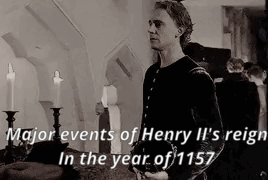





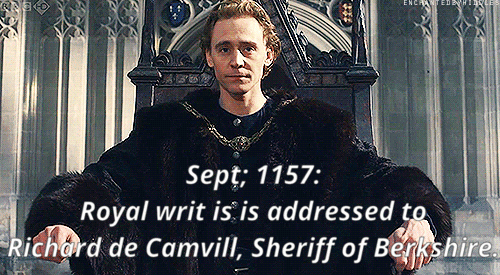

Selected events of Henry II’s reign. A.D. 1157.
Jan-March: During the King's stay in Normandy, Louis seems to have held a Court at Orleans, whereat he publicly recognized the right of Henry II., as Comte of Anjou and Seneschal of France, to custody of the Abbey of St. Julian at Tours. Among the witnesses of Louis's declaration were, Joscius, Archbishop of Tours (who appears to Vaiognes. have contested the matter previously) ; Philip, brother of the French King ; William fitz Hamo ; Robert de Novo Burgo; and Hugh de Cleeriis.
Feb. The Queen and her children leave Normandy, land at Southampton, and proceed to London. Hence at Michaelmas, 11.57, the Fermor of Southampton charges :
July. It was now probably that Malcolm, King of Scots, surrendered Bamborough, Newcastle, and Carlisle to the King. Malcolm seems to have passed through Yorkshire, Lincolnshire, and Nottinghamshire, and to have awaited King Henry at Peak Castle, in Derbyshire, and thence to Peak castle. have accompanied the King to Chester.
The King invades North Wales. The English army Chester falls into an ambuscade near Basingwerk (at Counsylth).Eustace fitz John and Robert de Courci were slain. Henry de Essex, Constable of England, disgraced himself (as was afterwards alleged) by personal cowardice. With reference to this Welsh expedition, there are many entries on the Pipe-Roll of the following Michaelmas.
Sept. Royal Writ, ascribed to this year, and probably belonging to the month of September, is addressed to Richard de Camvill, Sheriff of Berkshire (whose term of office expired at Michaelmas, 1157). It is in favour of Abingdon Abbey. It is dated at Windsor, and attested, singly, by Earl Reginald (of Cornwall). A Royal Charter, dated at Woodstock, confirms an agreement made between William Woodstock.fitz Gilbert and the Monks of Furness Abbey (Lancashire).
The witnesses (chiefly north-countrymen) are Hugh, Bishop of Durham ; Robert, Bishop of Lincoln ; Robert, Earl of Leicester ; Richard de Luci, William de Vesci, Geoffrey de Valoniis, William de Agremont, Aubert de Grellei, John Constable, Henry fitz Suan, Gospatric fitz Orm, Richard fitz Ivo, and Richard Pincerna. This Charter is expressed to be expedited 'per rnanus Stephani Capellani,'—a Vice- Chancellor, who will afterwards appear in a like capacity as 'Magister Stephanies de Ftdgeriis, Prcecentor of Moretain.
Queen Eleanor gives birth to a son, Richard, at Oxford. Hence at Michaelmas, 1157, the Sheriff of Oxfordshire charges: In corredlo Regince.
Source: Court, Household and Itinerary of K. Henry II
Fancast: Tom Hiddleston as Henry II and Jodie Corner as Eleanor of Aquitaine. Chris Pine as King Malcomn of Scotland; Johnattan Rhys-Meyers as King Louis VII of France.
#be noticed I don't own any gifs#I wanted only to make the story seen#henry ii of england#king henry ii of england#henry fitzempress#henry ii#henry curtmantle#tom hiddleston#jodie comer#queen eleanor#eleanor d'aquitaine#aliénora d'aquitaine#eleanor of aquitaine#richard i#richard lionheart#house of plantagenet#house of anjou#plantagenet#plantagenets#plantagenet dynasty#medieval england#louis vii of france#louis vii#johnattan rhys-meyers#chris pine#malcomn of scotland
19 notes
·
View notes
Photo






Hɪsᴛᴏʀɪᴄᴀʟ ᴄʜᴀʀᴀᴄᴛᴇʀs ᴡʜᴏ ᴅᴇsᴇʀᴠᴇᴅ ʙᴇᴛᴛᴇʀ [ ₄ /₁₀]﹕
● Hᴇɴʀʏ II ﹐ Kɪɴɢ ᴏғ Eɴɢʟᴀɴᴅ ●
● 𝖥𝖺𝗇 𝖼𝖺𝗌𝗍: ●
𝑀𝑖𝑐𝘩𝑎𝑒𝑙 𝐹𝑎𝑠𝑠𝑏𝑒𝑛𝑑𝑒𝑟 𝑎𝑠 𝐻𝑒𝑛𝑟𝑦 𝐶𝑢𝑟𝑡𝑚𝑎𝑛𝑡𝑙𝑒/𝐻𝑒𝑛𝑟𝑦 𝐼𝐼 𝑜𝑓 𝐸𝑛𝑔𝑙𝑎𝑛𝑑
#Henry II#King Henry II#Henry Curtmantle#Henry Fitzempress#Henry of Anjou#Angevin Empire#Angevins#Plantagenets#Plantagenet dynasty#House of Plantagenet#fancast#gifset#my edit#Michael Fassbender#as#Henry II of England#Alicia Vikander#Rosamund Clifford
22 notes
·
View notes
Text
@oflegislators
rosamund was familiar to repetition — she did not like it, but it had been easy to grow used to a stale routine at the nunnery, and it had also been easier to discard it and to turn to the spontaneity of her life in woodstock, where boredom was often suddenly replaced by the bubbling excitement in her belly whenever a messenger of her king came to her door ( if not her beloved himself ). in the purgatory, she had turned to necessity once more, relying on a routine to keep herself grounded — it was a difficult task, to say the least, to start again in this strange place, by herself too. childishly she had turned to the closest thing to a mother abbess she could find, as if in death she could accomplish what she had not been able to do in life, and it was madame de argenteuil herself the one to announce to the welsh scion, quite dispretentiously, on the day that marked yet another year of her anniversary, about the passing of the king of england.
heloise may have threaded around the news, but to be quite frank, rosamund’s talent to being subtle and unobtrusive was subpar, and many times had she been punished for her tendency to lean on extremes — she learned, of course, when the feel of the rod was still fresh in her skin and when she reminded herself of how she may embarrass the ones who cared for her, but she had often struggled against restraint, and it had been no different as she stared at the history page her patroness held as proof. the thought of her henry ( the man she had tried to forget for his, and her own good ) on his death bed in anjou, betrayed by all those he had once held dear was too much for her, and she had burst into tears ( much to the distress of madame de argenteuil, surely ).
then, perhaps, she should have prayed for him, for his soul to find rest in a better place, as she had done many times before, but the thought of god and a godly place escaped her — rosamund had often pretended so, assured her lord and lover that his will was the rightful one, but her honeyed lies were just that. who could she fool thinking henry would go to heaven ? it would be here or worse, and rosamund would have him here. he must come here, he must. for thirteen years she dared not to hope, not to dwell on what was long gone when she had been dead and buried for too long yet the sentiment rose to her chest again with ease as if she was back in her castle waiting for her husband to cross the maze to greet her with his fervent adoration.
the feeling remained throughout the following days, stirring in her belly as a hunger that could not be sated by food nor drink nor any sort of spiritual healings — not that she tries to sate the longing for him, even as the hope sours to an ache as the days strech, and he is nowhere to be seen on the place she first woke in this existence many years before, where she supposed would make the most sense for him to return to life ( if anything in this place made sense, that is ). but as much as she waits, this time again, hope is a cursed thing, and she begrudgingly must convince herself to resume the torture she has taken as normalcy.
it is when she has nearly ceasing the expectation that he falls on her eye line, unassuming as he had often wished to portray himself as, even as a king of one of the greatest empires known to men. her heart leaps, stubborn, fluttering against the restrains she had leashed it with, as she approaches the tavern, before he could walk in, and she would lose him from her sight forever, as in one of her worst dreams — so, naturally, she grabs onto him, whoever this new means of torture may be. ❝ henri ? ❞ it’s not him. It could very easily not be him — the man had been ruthless, but was that not the burden of all kings ? please. ❝ have you come for me ? ❞

#・ ˖ ✦ 🌹 𝖎𝖓𝖙𝖊𝖗𝖆𝖈𝖙𝖎𝖔𝖓 : the fairest flower in all the world.#with: henry fitzempress.#physical abuse tw#a small mention around the way but better safe than sorry !#religion tw
4 notes
·
View notes
Text
The White Ship Disaster
The White Ship was a Nef that sank on its way from Normandy to England on 25 November 1120. Now you might think that this is a normal shipwreck, but it is not that simple. This accident was the presumed cause of a civil war ( The Anarchy) in England that lasted for many years. Even before this event, there were already disputes about the succession to the throne and the claims of Normandy. As a result, the only legitimate son, William Ætheling, was confirmed by Henry I as successor and ruler of both territories, so he and his father had been in Paris. Now it was time to return to England and the company of several hundred people waited for good winds. A ship owner put his white ship, a commercial nef, at their disposal for this purpose. William boarded the ship with 300 noblemen and other gentlemen.
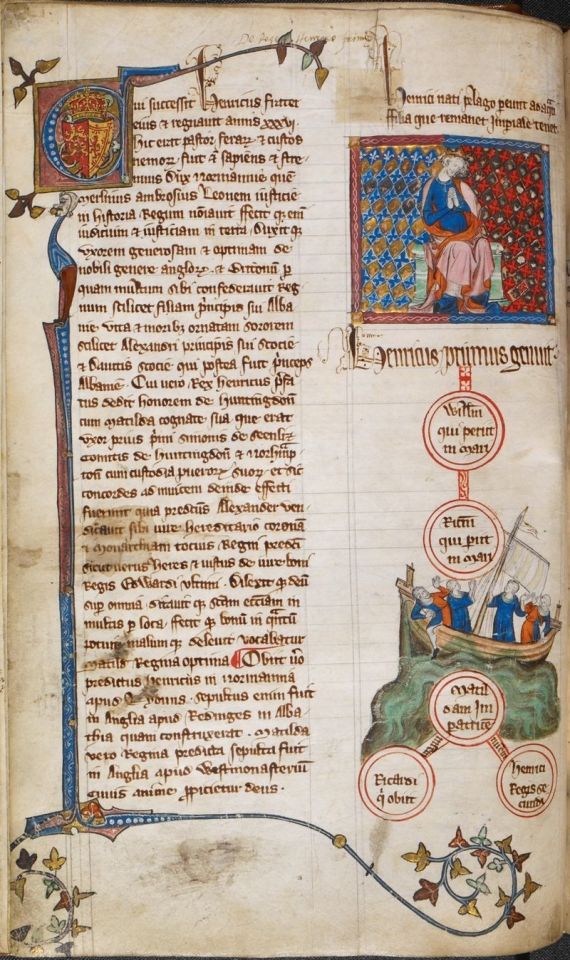
Henry I and his descendants,with the sinking of White ship, Liber legum antiquorum regum; Cotton Claudius D. ii, f. 45v. (x)
According to the contemporary chronicler Ordericus Vitalis, two of William's illegitimate half-siblings, Maud and Richard FitzRoy, also boarded the ship. Henry I took another ship, which also sailed first. The Nef followed in the night but ran onto a rock as it was leaving Barfleur harbour and sank in short order. Only one man, a butcher named Bérold or Guéroult from Rouen, could be rescued the next morning and report what had happened. This was recorded by the chronicler Ordericus Vitalis who gives an exact account of what has happend. According to this, William had already served plenty of wine on land and thus everyone was drunk, including the crew. That was the moment were Stephen of Blois, a nephew of Henry left the ship.

Detail of the royal family tree from Henry I to Henry II, showing King Henry I, his wife Matilda of Scotland, their children William Adelin and Matilda. Genealogical Chronicle of the English Kings: Royal MS 14 B V, Membrane 5
When the ship finally sailed, a noblewoman is said to have ordered the king's to be caught up. In their eagerness, no one paid attention to the well-known Quilleboeuf rock in front of the harbour exit, which crushed two planks on the starboard side. Water entered the ship and it sank very quickly. William Ætheling first managed to save himself in a small boat, but when his half-sister Maud called for help, he turned back. Now other drowning men tried to climb onto the boat, causing it to capsize. Except for the aforementioned butcher, all those present died.
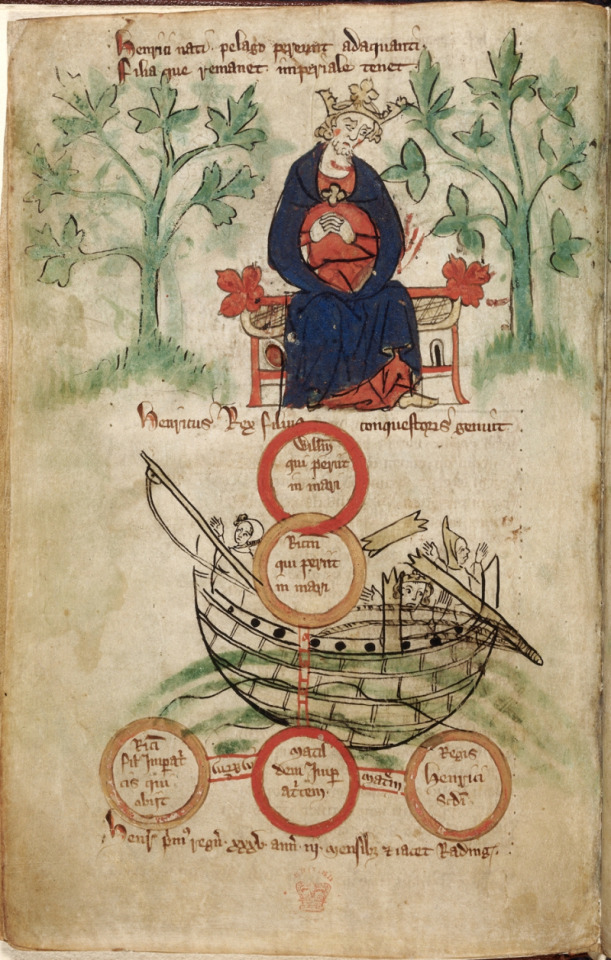
King Henry I and the White Ship in a series of images of English kings preceding Peter of Langtoft’s Chronicle, Royal 20 A. ii, f. 6v. (x)
This misfortune brought with it unforeseen consequences, for now Henry I, who had many children but only one legitimate heir, was once again without an heir. His wife Edith of Scotland had already died two years earlier. This meant that he had to marry again. Unfortunately, the marriage between him and Adelheid of Louvain remained childless and so, after his death in 1135, his daughter Empress Maud (Mathilde as she was actually called) widow of Henry V, the Holy Roman Emperor, would claim the throne. As she was considered unsuitable as a wife, Stephen of Blois, we remember the nephew of Henry I, was able to make his claim valid. An almost 20-year war of succession broke out between Stephen's and Matilda's parties, which the empress's son Henry FitzEmpress finally won. As Henry II, he ascended the English throne in 1154. He united England and the independent Duchy of Brittany with the French Duchies of Normandy and Aquitaine as well as the Counties of Maine, Touraine, Anjou and Poitou to form the Angevin Empire and established the centuries-long rule of the House of Plantagenet over England.
Why did the ship sink ?
Apparently, and if contemporary sources are to be believed, it was due to the wine that was generously given out. Which ensured that even the crew were so drunk that they forgot to follow the fine line and sailed against it. (Reminiscent of the Titanic and the iceberg, but with the royal family) Strangely, Stephen of Blois left the ship beforehand. Some few now say that he planned it all and that he was actually the one who let the wine flow and also made sure that more flowed during the voyage.
Interestingly, historian Victoria Chandler ("The Wreck of the White Ship: A Mass Murder Revealed?", The Final argument) has found that someone else was involved in the disaster, a steward named Pirou. But no one knows how he survived, whether he was on board or not. Was he the one who served the wine on behalf of Blois? These are questions that still cannot be answered today, but leave a lot of room for speculation. Because if Blois was really involved, then it was not an accident but a mass murder.
Besides Chandler's book, I also recommend Charles Spencer's - The White Ship and Judith A. Green, Henry I: King of England and Duke of Normandy. If you want to read more about this case.
170 notes
·
View notes
Note
Has there ever been a thing in history where like, a nobleman and his king ended up fighting over the love of a woman and it caused a giant war or lasting political tensions?
The entire relationship between Eleanor of Aquitaine, Henry II and Louis VII. So here's the tea: France as we know it today didn't exist. The Kingdom of France was actually incredibly small with most of its territories actually in the hands of independent sovereign nobles, including Eleanor and the English Crown. Eleanor owned a good portion of France so it was decided that she would marry Louis, the French King. They didn't get on, mainly because Louis was really religious and bored Eleanor and she never gave him sons, they also had a very scandalous blowout on the way to the Crusades. They annulled their marriage and Eleanor left the marriage with her lands. She married Henry FitzEmpress, the heir to the English throne and the rest of the western coast of France. Together, they ruled more France than the French & had a multitude of sons which really grated on Louis but despite this, the couple were actually vassals of the French Crown which made everything every awkward, especially when Eleanor fell out with Henry and tried to start a war.
19 notes
·
View notes
Text

the fiercest, the relentless ... KING HENRY FITZEMPRESS !
3 notes
·
View notes